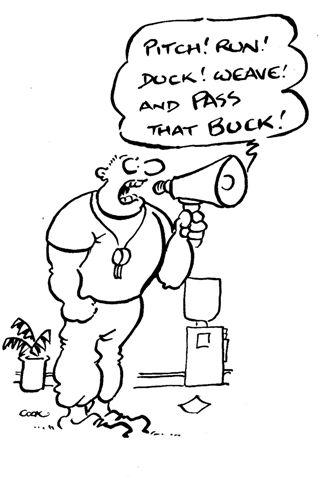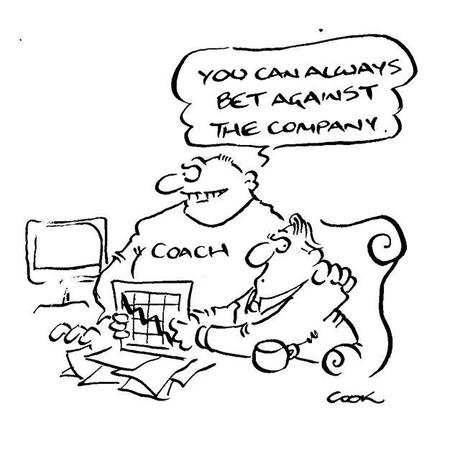What can we learn from sports psychology?
My daughter is a showjumper. She recently competed in a major event at an international venue. She was up against a huge field of Olympic riders on high-class horses bred specifically for the sport. It was a major step up for her. There was no shortage of stress ahead of the day.
 Stress turns up in any competitive situation and it’s easy to be distracted by factors that work against your performance. They preoccupy your consciousness, crowding out the ability to focus on the things that matter. It takes a particular mental toughness to let go of the things you can’t control and stay on the things you can master.
Stress turns up in any competitive situation and it’s easy to be distracted by factors that work against your performance. They preoccupy your consciousness, crowding out the ability to focus on the things that matter. It takes a particular mental toughness to let go of the things you can’t control and stay on the things you can master.
Sports psychologist, Gareth Mole, defines mental toughness as not being distracted by the things over which you have no absolute control. Top performers, he says, focus on the things they can guarantee and leave aside the things that, at best, they can only influence.
It’s no surprise that this relieves stress. Why waste mental and nervous energy on things you can’t do anything about when you could be applying that energy to where you can make a difference? The former generates stress; the latter builds confidence.
The distinction between the two has clear parallels for prioritizing business effort.
What are the things you can’t control in sport?
Your results, for one. You can do the best you can, but you can’t control them. On the day, the bounce of the ball might just favor someone else. Ditto for any aspect of the past or the future. Nor do you have control over other people, the environment, accidents, genetics or equipment.
What about business?
You can influence your business results but you can’t guarantee them. The past and the future are out of your hands. You can train and manage your people but you can’t guarantee their performance. The market environment is not decided by you. Despite your risk management, accidents will always happen. The resources you have are exactly that and there is no guarantee your equipment or processes will not  malfunction. Focus on those possibilities is wasted effort.
malfunction. Focus on those possibilities is wasted effort.
So what does that leave us? Mole’s antidotes apply to business as much as sport, or life for that matter.
- You can guarantee how much you practice. Do you constantly work on your systems and process so that your business machine hums? What’s best practice in your industry and do you put 100% into achieving it?
- How about yourself? Having a healthy, fit body that eats and sleeps properly is up to you. People manage other people better when they look after themselves. Overwork kills creativity. Time-out let’s it prosper. Have you got that in balance?
- Mental practice is also your call and it pays dividends. Contrary to a lot of motivational hype, don’t visualize success. Rather, visualize yourself exercising the management techniques that will make you successful. Work on the process, not on the outcome.
My daughter’s demeanor on the day wasn’t entirely stress-free but using the ideas above, her energy was focused on what she could control. For the record, she didn’t win. Her performance, however, was excellent.

Sports psychologist, Gareth Mole, defines mental toughness as not being distracted by the things over which you have no absolute control. Top performers, he says, focus on the things they can guarantee and leave aside the things that, at best, they can only influence.
It’s no surprise that this relieves stress. Why waste mental and nervous energy on things you can’t do anything about when you could be applying that energy to where you can make a difference? The former generates stress; the latter builds confidence.
The distinction between the two has clear parallels for prioritizing business effort.
What are the things you can’t control in sport?
Your results, for one. You can do the best you can, but you can’t control them. On the day, the bounce of the ball might just favor someone else. Ditto for any aspect of the past or the future. Nor do you have control over other people, the environment, accidents, genetics or equipment.
What about business?
You can influence your business results but you can’t guarantee them. The past and the future are out of your hands. You can train and manage your people but you can’t guarantee their performance. The market environment is not decided by you. Despite your risk management, accidents will always happen. The resources you have are exactly that and there is no guarantee your equipment or processes will not 
So what does that leave us? Mole’s antidotes apply to business as much as sport, or life for that matter.
- You can guarantee how much you practice. Do you constantly work on your systems and process so that your business machine hums? What’s best practice in your industry and do you put 100% into achieving it?
- How about yourself? Having a healthy, fit body that eats and sleeps properly is up to you. People manage other people better when they look after themselves. Overwork kills creativity. Time-out let’s it prosper. Have you got that in balance?
- Mental practice is also your call and it pays dividends. Contrary to a lot of motivational hype, don’t visualize success. Rather, visualize yourself exercising the management techniques that will make you successful. Work on the process, not on the outcome.
My daughter’s demeanor on the day wasn’t entirely stress-free but using the ideas above, her energy was focused on what she could control. For the record, she didn’t win. Her performance, however, was excellent.

